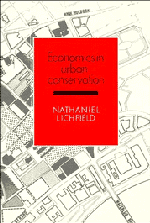Book contents
- Frontmatter
- Contents
- List of diagrams, tables and plans
- Preface
- Acknowledgements
- Introduction
- Part I Planning and management in the conservation of the urban system
- Part II Conservation of the cultural built heritage
- Part III Economics in urban conservation
- Part IV Selected tools of economic analysis for project evaluation
- Part V Case studies in the economics of conservation of the CBH
- Notes
- Bibliography
- Index
Part III - Economics in urban conservation
Published online by Cambridge University Press: 10 November 2010
- Frontmatter
- Contents
- List of diagrams, tables and plans
- Preface
- Acknowledgements
- Introduction
- Part I Planning and management in the conservation of the urban system
- Part II Conservation of the cultural built heritage
- Part III Economics in urban conservation
- Part IV Selected tools of economic analysis for project evaluation
- Part V Case studies in the economics of conservation of the CBH
- Notes
- Bibliography
- Index
Summary
Introduction
The opening paragraph of a recent report with the compelling title The Livable City stated:
1 The World Conservation Strategy, the starting point for the British programme, is about matching the superficially conflicting goals of development and conservation: development being the means of meeting human needs and improving the quality of life and conservation being the use of resources, especially living ones, in a sustainable way, so safeguarding all their benefits for future generations.
3 … the Strategy reflects the growing convergence over the last decade of environmental and development thinking: that both are about sustainability and that to succeed in realising their potential benefits both must impinge upon the lives of people at the local level.
6 Conservation has never been seen as having a dominant part to play in the affairs of urban areas
And the first chapter concludes with a quotation from Barbara Ward: ‘For an increasing number of environmental issues, the difficulty is not to identify the remedy because the remedy is now understood. The problems are rooted in the economy and society.’
This reference to how economics can play its role in society, which is concerned with development and conservation, is a useful starting point for Part III. We wish to emphasise that economics has an essential role in the reconciliation of the interdependent, and superficially conflicting, goals of development and conservation in the face of limited resources; and that the sensible use of economics for the purpose can achieve better results in both development and conservation for the people who are affected.
- Type
- Chapter
- Information
- Economics in Urban Conservation , pp. 111 - 116Publisher: Cambridge University PressPrint publication year: 1989



